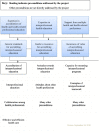Development of accreditation standards for interprofessional education: a Canadian Case Study
- PMID: 33472633
- PMCID: PMC7818738
- DOI: 10.1186/s12960-020-00551-2
Development of accreditation standards for interprofessional education: a Canadian Case Study
Abstract
Background: Academic institutions worldwide are embedding interprofessional education (IPE) into their health/social services education programs in response to global evidence that this leads to interprofessional collaborative practice (IPC). The World Health Organization (WHO) is holding its 193 member countries accountable for Indicator 3-06 ('IPE Accreditation') through its National Health Workforce Accounts. Despite the major influence of accreditation on the quality of health and social services education programs, little has been written about accreditation of IPE.
Case study: Canada has been a global leader in IPE Accreditation. The Accreditation of Interprofessional Health Education (AIPHE) projects (2007-2011) involved a collaborative of eight Canadian organizations that accredit pre-licensure education for six health/social services professions. The AIPHE vision was for learners to develop the necessary knowledge, skills and attitudes to provide IPC through IPE. The aim of this paper is to share the Canadian Case Study including policy context, supporting theories, preconditions, logic model and evaluation findings to achieve the primary project deliverable, increased awareness of the need to embed IPE language into the accreditation standards for health and social services academic programs. Future research implications are also discussed.
Conclusions: As a result of AIPHE, Canada is the only country in the world in which, for over a decade, a collective of participating health/social services accrediting organizations have been looking for evidence of IPE in the programs they accredit. This puts Canada in the unique position to now examine the downstream impacts of IPE accreditation.
Keywords: Accreditation; Health professional education; Interprofessional education.
Conflict of interest statement
The authors declare that they have no competing interests.
Figures


References
-
- Accreditation of Interprofessional Health Education. Accreditation of interprofessional health education (AIPHE) principles and practices for integrating interprofessional education into the accreditation standards for six health professions in Canada. 2009. http://www.cihc-cpis.com/uploads/1/2/4/7/124777443/aiphe_principles_and_.... Accessed 18 Nov 2020.
-
- Centre for Advancement of Interprofessional Education (CAIPE). (2002/2018). Definition of Interprofessional Education (Revised). https://www.caipe.org/about-us. Accessed 18 Nov 2020.
-
- World Health Organization. Framework for Action on Interprofessional Education & Collaborative Practice. Geneva, Switzerland. 2010. http://www.who.int/hrh/resources/framework_action/en/. Accessed 24 Jan 2020.
Publication types
MeSH terms
LinkOut - more resources
Full Text Sources
Other Literature Sources
Research Materials

